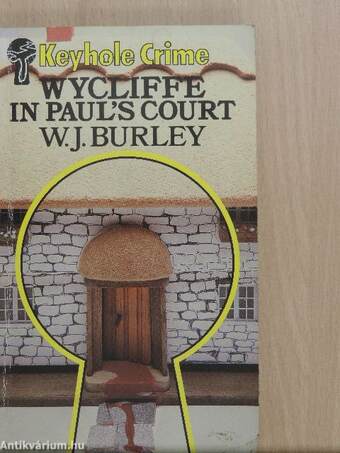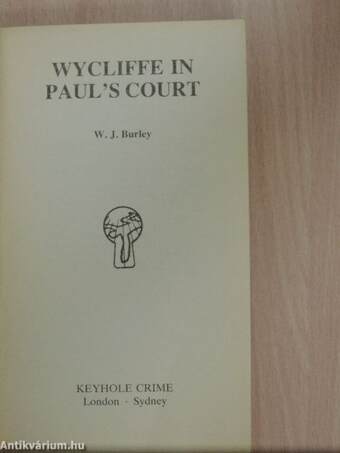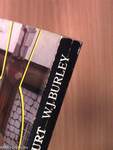1.118.086
kiadvánnyal nyújtjuk Magyarország legnagyobb antikvár könyv-kínálatát
Wycliffe in Paul's Court
| Kiadó: | Keyhole Crime |
|---|---|
| Kiadás helye: | London |
| Kiadás éve: | |
| Kötés típusa: | Ragasztott papírkötés |
| Oldalszám: | 191 oldal |
| Sorozatcím: | Keyhole Crime |
| Kötetszám: | 79 |
| Nyelv: | Angol |
| Méret: | 18 cm x 11 cm |
| ISBN: | 0-263-74129-x |
naponta értesítjük a beérkező friss
kiadványokról
naponta értesítjük a beérkező friss
kiadványokról
Fülszöveg
CHAPTER ONE
Nobody in Falcon Street asked themselves where Willy
Goppel had come from or how it was that the Dolls' House Shop
had become as much a part of the street as St Olave's Church or
the Old Mansion House or the market which closed the street" to
vehicles every Saturday. Willy Goppel had established himself
as an institution, accepted uncritically. He spoke precise English
with a German accent for, like the Bayreuth Festival, the Passion
Play, Mad King Ludwig and the Nazi Party, Willy was Bavarian
born. Many people in the street remembered his English wife
but she had died years ago leaving him with a six-year-old son
and some house property scattered about the city. His son
Frederick, now a man, had left home though he still visited his
father when he needed money. The property had grown too, both
in value and extent, and though few people realized it, Willy was
a wealthy man.
Willy lived over his shop in part of an old house of which the
other, larger... Tovább
Fülszöveg
CHAPTER ONE
Nobody in Falcon Street asked themselves where Willy
Goppel had come from or how it was that the Dolls' House Shop
had become as much a part of the street as St Olave's Church or
the Old Mansion House or the market which closed the street" to
vehicles every Saturday. Willy Goppel had established himself
as an institution, accepted uncritically. He spoke precise English
with a German accent for, like the Bayreuth Festival, the Passion
Play, Mad King Ludwig and the Nazi Party, Willy was Bavarian
born. Many people in the street remembered his English wife
but she had died years ago leaving him with a six-year-old son
and some house property scattered about the city. His son
Frederick, now a man, had left home though he still visited his
father when he needed money. The property had grown too, both
in value and extent, and though few people realized it, Willy was
a wealthy man.
Willy lived over his shop in part of an old house of which the
other, larger part, was occupied by the Wards who ran a sub
post office and sold stationery, sweets and tobacco. A broad
archway sliced through the ground floor of the house giving
access to three modern dwellings built round a courtyard which
had a splendid oak tree in the middle. A century before, the Paul
family, carriers in a fair way of business, had lived in the house
and kept their horses and waggons in appropriate buildings round
the courtyard; now, the carrier business forgotten, those build-
ings had been replaced by three rather pleasant houses, secluded,
not far from the city centre, and known as Paul's Court.
It had been another day of the September heatwave and in the Vissza
Témakörök
- Idegennyelv > Idegennyelvű könyvek > Angol > Szépirodalom > Regény, novella, elbeszélés
- Idegennyelv > Idegennyelvű könyvek > Angol > Szépirodalom > Szórakoztató irodalom > Krimi
- Szépirodalom > Regény, novella, elbeszélés > Tartalom szerint > Detektívregények
- Szépirodalom > Szórakoztató irodalom > Krimi













